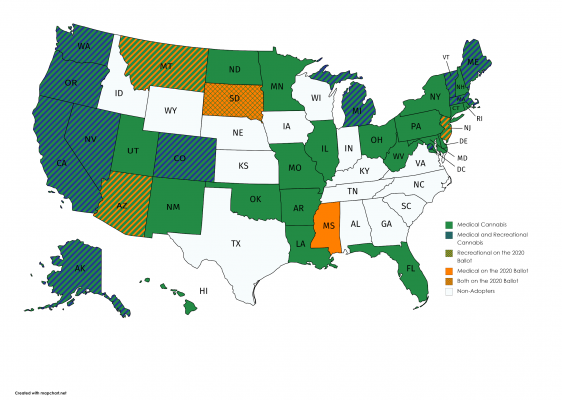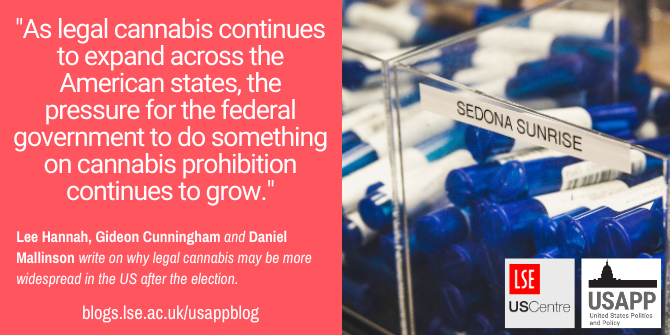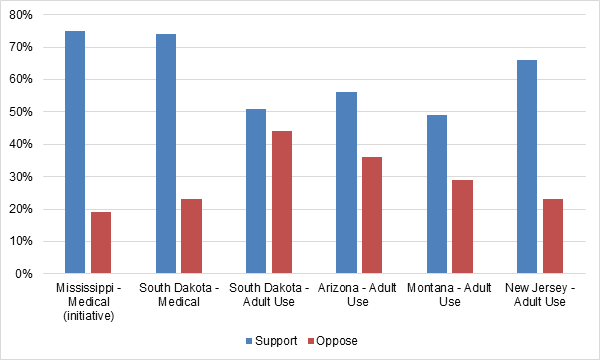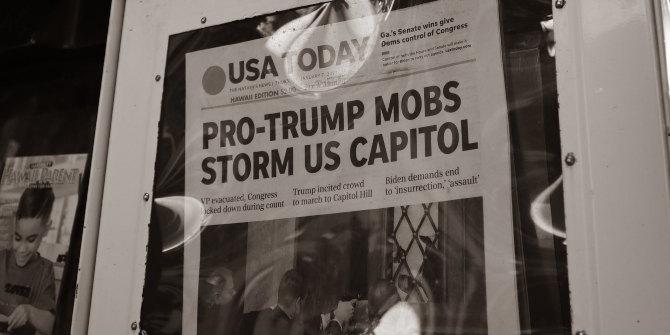

 The process of implementing comprehensive cannabis legislation varies between states and is often met with bureaucratic challenges. With many states putting medical and recreational cannabis on the ballot this election, Lee Hannah, Gideon Cunningham and Daniel Mallinson look at the key differences in these states’ approaches to legalisation. The increasing momentum on legal cannabis, they write, is likely to put further pressure on Congress to pass national cannabis policy reform.
The process of implementing comprehensive cannabis legislation varies between states and is often met with bureaucratic challenges. With many states putting medical and recreational cannabis on the ballot this election, Lee Hannah, Gideon Cunningham and Daniel Mallinson look at the key differences in these states’ approaches to legalisation. The increasing momentum on legal cannabis, they write, is likely to put further pressure on Congress to pass national cannabis policy reform.
The expansion of legal cannabis for medical and adult-use continues to be driven by the ballot initiative, and the 2020 election is no different. How might these initiatives and the results of the 2020 election affect cannabis policy across the United States?
Advocates continue to use the ballot initiative to advance cannabis policy
In our research on how medical cannabis laws have spread across the US, we found that the availability of the direct initiative – a form of referendum on a policy or law – was a significant factor in whether or not states passed such laws – especially among the early adopting states. And when it comes to adult-use, or what’s known as ‘recreational’ cannabis, the pattern is even stronger. Ten of the eleven adult-use cannabis state laws were passed by the initiative.
Figure 1 below shows the status of cannabis in the states. Currently 33 states and the District of Columbia have a medical program. At the same time, 10 of those states and D.C. also have recreational, or adult-use, programs. Finally, we have marked the states where legal cannabis could expand in this election.
Figure 1 – Status of cannabis policy in the US

Medical cannabis initiatives
In the 2020 election, voters in Mississippi and South Dakota will consider medical cannabis bills. Both states’ stories are much more complicated than previous initiative campaigns.
The expansion of medical cannabis into South Dakota fits a trend that we anticipated when looking at the 2018 midterms. South Dakota is one of only four states with the direct initiative that had not passed a medical cannabis bill. In fact, it looked like three of the four remaining states were going to vote on medical cannabis, but a signature collection effort in Idaho was deterred by the pandemic and the Nebraska bill was halted by the state supreme court in September. The South Dakota story is unique though, because they will also be considering an adult-use initiative alongside the medical cannabis expansion on the same ballot.
Meanwhile, activists in Mississippi have used the indirect initiative to get a medical cannabis bill on the ballot. The indirect initiative gives the state legislature the option to adopt the initiative, reject it, or propose an alternate policy alongside the citizen – or direct – initiative. The Mississippi legislature took the opportunity to propose an alternative policy.
Legislators that are skeptical of cannabis have devised new methods to contest initiatives
We might be observing a new trend where legislatures in direct democracy states preempt initiatives with more restrictive laws, which was the case in Ohio in 2016, or tinker with the law after its passage, as we saw in Utah in 2018. The Mississippi legislature has apparently taken note of those efforts.
In Mississippi, voters will decide between two competing medical cannabis initiatives in a two-step process, Initiative Measure 65 and Alternative Initiative Measure 65A. Initiative 65 was brought forward as a citizen-submitted initiative that is consistent with other comprehensive medical policies. The Mississippi State Legislature passed a far more restrictive policy that will appear alongside the initiative as Alternative Initiative Measure 65A.

Photo by Jeff W on Unsplash
Advocates for Initiative 65 and Mississippi House Democrats have protested the two competing initiatives appearing on the same ballot. They assert that the dual appearance of two separate and remarkably different medical cannabis initiatives is designed by the state legislature to cause voter confusion, potentially leading to the defeat of Initiative Measure 65 or adoption of the more restrictive Alternative Initiative Measure 65A.
As for actual voting, the Mississippi ballot will present voters with a two pronged question. The first half of the question will ask voters a simple “either measure” or “neither measure” on medical cannabis legalization. The second half of the ballot question is a decision between Initiative 65 and Initiative 65A.
When voting, if a majority votes “neither measure” on the first half of the ballot question, no medical cannabis legalization occurs. If a majority votes “either measure” on the first half of the ballot question, then the initiative with the majority of votes will enact medical cannabis legalization and become a part of the Mississippi Constitution.
South Dakota will consider medical and adult-use cannabis
The South Dakota ballot will feature two citizen initiatives, one legalizing medical cannabis and the other legalizing adult-use. Support for both citizen-initiatives are driven by New Approach South Dakota, the Marijuana Policy Project and South Dakota for Better Marijuana Laws. If both policies pass, South Dakota will become the first state to adopt an adult-use program without the advantage of learning first from its own medical program.
Adult-Use Initiatives
In addition to South Dakota, three other states are considering initiatives that would legalize adult-use cannabis: Arizona, Montana, and New Jersey. If the policies are approved, these states fall in line with a consistent pattern for adult-use cannabis. The states are using the initiative method to pass the law and the states have also already adopted and implemented laws enabling medical cannabis. In fact, medical dispensaries with multiple state sites are behind much of the funding for the initiative in Arizona.
In Arizona, voters will decide on an adult-use cannabis legalization initiative for the second time in four years. The first attempt at a citizen-initiated adult-use cannabis legalization initiative was narrowly defeated in 2016, with 51.3 percent opposed. Advocates for the latest effort are taking lessons learned from the failed initiative campaign in 2016 by trying to address issues raised by big business and law enforcement.
Montana voters will vote on two citizen-initiated complementary ballot initiatives regarding adult-use cannabis legalization this November, I-190 and CI-118. I-190 sets up an adult-use cannabis program and CI-118 would amend the constitution to guarantee those 21 and over can use cannabis just like alcohol. Interestingly, the Montana initiative aims to protect the local industry by limiting licenses in the first 12 months to established medical dispensaries and state residents
With the support of Democratic Governor Phil Murphy, the New Jersey State Legislature became the first legislative body to refer adult-use cannabis legislation to voters. The vote to place the measure on the 2020 ballot fell along mostly partisan lines with 72 of 79 legislative Democrats voting in favor, and 36 of 41 legislative Republicans opposing the resolution. New Jersey’s adoption would increase pressure on its neighbors – Pennsylvania, New York, and Connecticut – to act. The four governors previously met to coordinate their efforts on cannabis legalization and Pennsylvania’s Lt. Governor John Fetterman tweets regularly about the implications of New Jersey’s legalization for his state.
Public Support for Cannabis Initiatives
Figure 2 below lists the most recent polling for each of the initiatives. The numbers do not add up to 100 due to many undecided voters. Consistent with national opinion trends, it appears that the medical bills have broad support while the adult-use bills could end up going either way. Regardless, it is likely that the cannabis landscape will look different on November 4. Moreover, these adoptions might increase pressure on neighboring states to act and will continue to inform activists about ways to successfully craft and frame legislation.
Figure 2 – Polling for cannabis initiatives

Note: Totals do not add up to 100 due to undecided voters.
Federal Implications
As legal cannabis continues to expand across the American states, the pressure for the federal government to do something on cannabis prohibition continues to grow. Further, Republican federal lawmakers increasingly find themselves in states with formalized cannabis programs, the pressure mounts even more. Perhaps there will be something for Senators John Thune (R-SD), Mike Rounds (R-SD), Rogers Wickers (R-MS), and Cindy Hyde-Smith (R-MS) to learn from Cory Gardner (R-CO), should he be re-elected, and South Dakota and Mississippi liberalize their cannabis laws. We have already seen conservatives move on the issue of industrial hemp, including Mitch McConnell (R-KY), when the incentives for their states were clear.
That being said, federal action has been percolating for some time, but gridlock in Congress (particularly the Republican-controlled Senate led by Mitch McConnell) has stymied all efforts at banking reform, expungements of criminal records, and support for the cannabis industry during COVID-19. A lack of federal action creates many administrative problems for federal and state regulators. Democrats were ridiculed by Republicans for mentioning cannabis in COVID relief legislation more than jobs, illustrating the substantial stigma remaining in Congress against the industry. While state pressure continues to build, it does not automatically lead to federal action. Who wins the White House and which party controls the Senate are just as important indicators for the future of cannabis policy as good news for pro-cannabis advocates from state initiatives and referendums in 2020.
Please read our comments policy before commenting.
Note: This article gives the views of the author, and not the position of USAPP – American Politics and Policy, nor of the London School of Economics.
Shortened URL for this post: https://bit.ly/34TysFp
 Lee Hannah – Wright State University
Lee Hannah – Wright State University
Lee Hannah (@LeeHannahWSU is an Associate Professor of Political Science in the School of Public and International Affairs at Wright State University. His research focuses on state politics, policy diffusion, elite behavior, and cannabis policy.
 Gideon Cunningham – Wright State University
Gideon Cunningham – Wright State University
Gideon Cunningham is an M.A candidate at the School of Public and International Affairs at Wright State University. His research interests include political theory and its effects on public policy and economic inequality, comparative public policy, comparative foreign policy, cannabis policy and secessionist movements.
 Daniel Mallinson – Pennsylvania State University-Harrisburg
Daniel Mallinson – Pennsylvania State University-Harrisburg
Daniel Mallinson is an Assistant Professor of Public Policy and Administration at Penn State Harrisburg’s School of Public Affairs. His research focuses on policy diffusion, pedagogy, and marijuana, energy and environmental policy.






